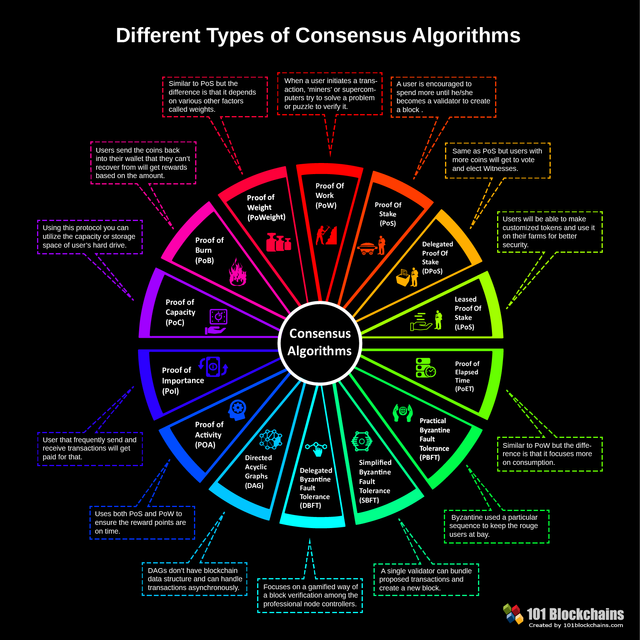Consensus algorithms updated (draft) - Feedback requested

I like this picture, but when reading the descriptions, I got very confused.
I think some descriptions are misleading, so I updated the below table.
Any feedback?
Proof-of-Work
Blocks with transactions are confirmed by energy intensive mining. The native token reward in return for energy usage incentivices honest behaviour
Proof-of-Stake
Blocks are confirmed by nodes withthat stake their tokens. The native token reward incentivices honest behaviour.
Proof-of-Activity
Hybrid version of PoW (mminers) and PoS (validators), rewards are split between both
Proof-of-Importance
New blocks are confirmed by nodes with a higher importance score that takes overal support to the network into account
Proof-of-Capacity
Blocks are confirmed by nodes in proportion to the hard drive space. Larger hard drives increase chances to win the reward
Proof-of-Burn
Blocks are confirmed by miners that show proof that they send coins to a verifiably unspendable addres
Proof-of-Weight
A weight is allocated to accounts depending on the amount of tokens. Higher
Delegated Proof-of-Stake
POS with the possibility for users to delegate their tokens in return for a percentage of rewards
Leased Proof-Of-Stake
POS with the possibility for users to Lease their tokens to full nodes in return for a perecntage of rewards
Bonded Proof of Stake
POS with optional delegation and increased punishments for fraudulent behavior
Liquid Proof of stake
POS with a more dynamic set of validators
Pure Proof of stake
POS, with block rewards porportionate to account balances and with separation of keys for spending and block confirmation
Proof of Elapsed Time
New transactions are confirmed by validators that are stochastically chosen, similar to a lottery
Practical Byzantine Fault Tolerance
Consensus by trusted nodes without a leader or center, nodes verify each others reliability. Requires a minimum of 2/3 of hones nodes.
Simplified Byzantine Fault Tolerance
One designated block generator collects and validates proposed transactions, periodically batching them together into a new-block proposal
Delegated Byzantine Fault Tolerance
Participants elect trusted nodes that reach agreement on the blockchain through majority voting.
Directed Acyclic Graphs
Consensus is reached on a transaction-by-transaction basis by other participants that execute transactions